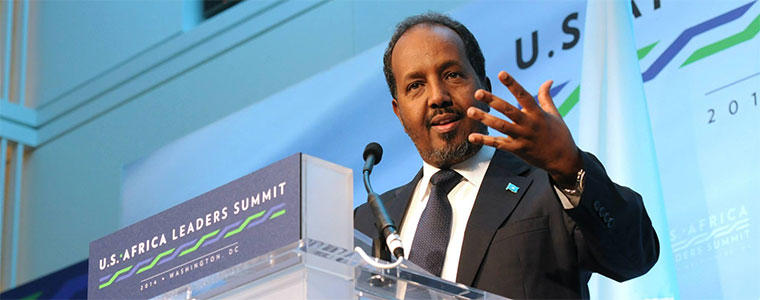U.S.-Africa Summit: To Spur Growth, Address Violence and Governance
The high-profile U.S.-Africa Leaders Summit in Washington this week is an opportunity not to be missed. Fifty leaders of African nations are convening in with President Barack Obama in a demonstration of America’s commitment to Africa’s own priorities for economic growth, security and democratic development. The U.S. can draw on Africa’s impressive progress and its enormous potential by jointly developing an all-embracing strategy to confront the continent’s central challenges: violence and institutional weakness.

Past and current U.S. initiatives have helped improve the lives of people across the continent and continue to bear the promise of more gains. Programs implemented with African partners have curbed AIDS and malaria, expanded sustainable agriculture and food security, and aim to double the number of people with access to electricity in sub-Saharan Africa.
The continent also holds real opportunities for economic growth, as American companies such as Microsoft, IBM and Google have already discovered. Exports of U.S. goods to sub-Saharan Africa soared 250 percent over a decade to $24 billion last year, and imports increased 53 percent to $39.3 billion, according to the Office of the U.S. Trade Representative. But any investor wants assurance that an entrepreneurial venture will be protected physically and legally.
White House officials have said the Leaders Summit will focus on how to advance progress on expanding trade and investment, engaging young African leaders, promoting inclusive and sustainable development and expanding cooperation on peace and security.
One way to help accomplish those goals is to address head-on what I believe is the most significant problem facing Africa – violence. Despite improvements in some parts of the continent, violent conflict remains a major scourge, and a principal obstacle hindering efforts to better the lives and welfare of Africa’s more than 1 billion people. Half of the 10 most violent countries in the world in 2013 were in Africa, as are three of the 10 nations where violence is likely to accelerate, according to the Global Peace Index, a study conducted by Vision of Humanity for the Institute for Economics and Peace.
Undercutting Priorities
Violence manifests not only in rebellions, insurgencies and civil conflicts, but also in criminality and even domestic violence. A 2013 Global Study on Homicide by the United Nations Office on Crime and Drugs found that homicide rates in southern Africa are four times higher than the global average and central Africa was not far behind.
Whether during conflict or otherwise, violence undercuts all our hopes and policy goals for Africa – economic growth, trade and investment, food security, health, human rights, environmental conservation. As USIP Acting President Kristin Lord wrote in a May 29 commentary for Foreign Policy, conflict “is a challenge U.S. policymakers cannot view separately from their other agendas, since violence is likely to prevent – or even destroy – any progress.”
Violence and institutional weakness are directly linked. Weak governance and corruption have become major drivers of conflict by hampering the ability to deliver services that citizens have every right to expect. In Nigeria, a burgeoning youth population thus turns to groups like the militant Boko Haram that they see as better able to provide some form of justice or a livelihood.
Institutional failure is also a factor in the rapid growth of religious fundamentalism of all kinds, which has in turn contributed to violent confrontations in places like northern Nigeria and the Central African Republic. In my experience serving in West Africa, the growth of these more extreme religious expressions has been fueled, at least in part, by the popular disillusionment with the failure of secular institutions to respond to basic needs and aspirations, from health to education to human security. The void has increasingly been filled by militant groups eager to advance their own radical and extremist agendas.
Preventive approach
There is no question that the violence spawned by extremists requires a forceful response. But experience has shown that reliance on a military response alone is unlikely to succeed.
What Africa needs – and what the U.S. and other partners need to find more effective ways to support – is a more pro-active approach to conflict prevention, management and mitigation. That means strengthening those elements of governance and civil society that can bolster resilience for individuals and communities under stress.
Structured dialogue forums, for example, can bring together citizens with law enforcement and justice-sector officials to find common ground and shared interests and approaches for improving security. Civic activists can sit down in community forums with government officials to jointly craft public-spending plans for the common good. Dialogue has been used successfully to mobilize communities to prevent election violence.
Such approaches can help extend hard-won peace in the aftermath of military conflict, or help reduce the need for armed intervention in the first place.
President Obama articulated the need for smarter, more effective strategies for addressing violence and a greater emphasis on non-military responses in his West Point address. And the administration recognizes that civilian institutions of governance need to be fortified at all levels. While military force might set back extremist militants for a time, a peacebuilding approach could empower and support Africans at the grass roots and in government to work together on developing their own creative, constructive and permanent solutions.
The U.S.-Africa Leaders Summit presents an opportunity to act on that recognition by placing a higher priority on approaches that have been proven effective. If we do it right, as we’ve learned to do, we can, in fact, counteract some of the obvious factors that spawn violence, and that in turn threaten the potential for progress that we see in Africa.
Ambassador George E. Moose is vice chairman of the board for the U.S. Institute of Peace. A retired career member of the Foreign Service, Moose served as U.S. ambassador to Benin and Senegal and later as assistant secretary of state for African affairs. He also served on three occasions in different capacities as a U.S. representative to the United Nations.



